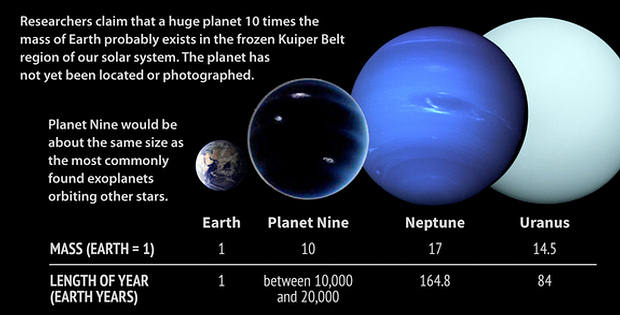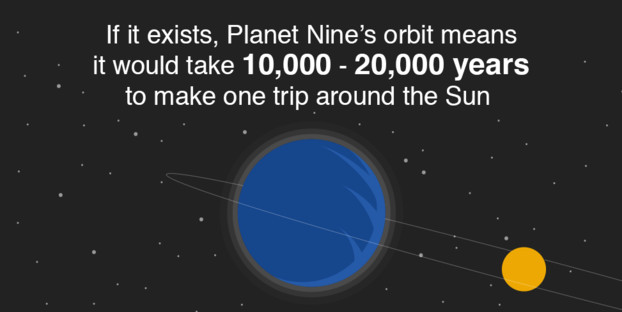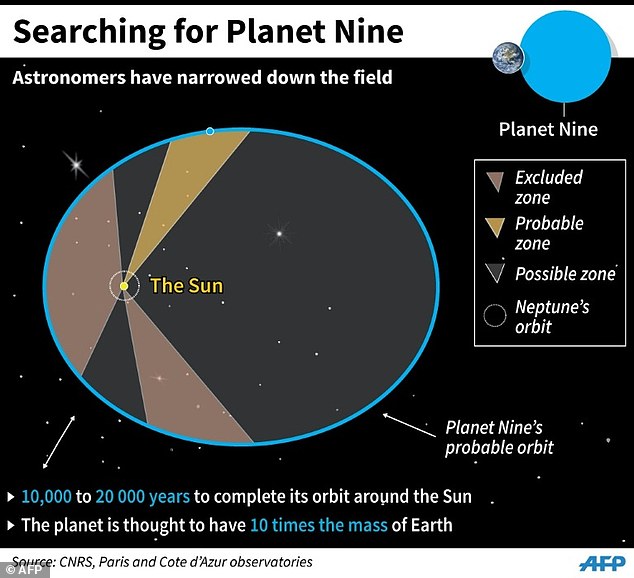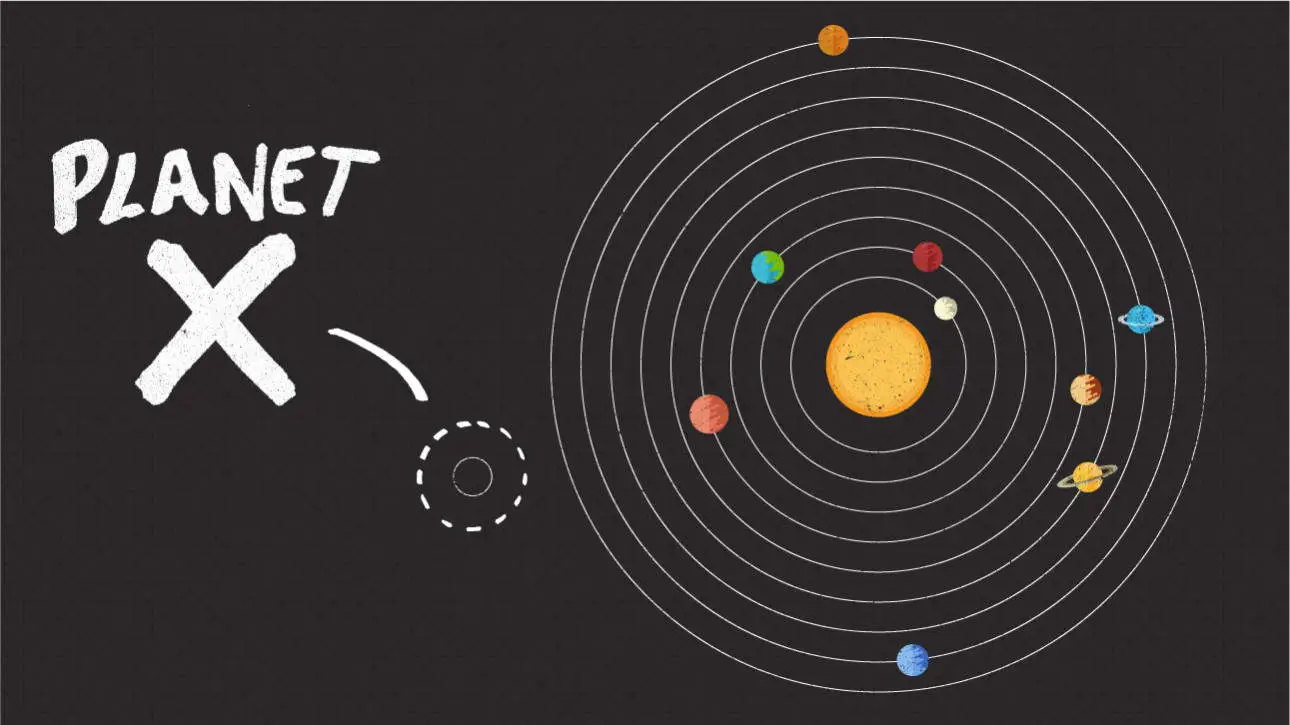Planet X is without a doubt, one of the most enigmatic and mysterious planets said to exist within the outer reaches of our solar system.
The planet referred to by many as simply X, Nibiru (according to ancient Sumerian Texts) and the Ninth planet by astronomers, is said to be located in the outer reaches of our solar system, far beyond the orbit of Pluto. The elusive planet is said to approach the inner parts of our solar system approximately every 25,000 years or so, causing destruction along its way.
However, until recently, the planet was believed to be just another myth, another set of stories without any scientific background to back up its existence. However, everything changed in January of 2016, when researchers from Caltech said they had firm indications which suggest the planet is not a myth and does, in fact, exist beyond the orbit of Pluto. It is believed for some time now, that there are Kuiper belt objects which have strange characteristics attributed to them, their orbit is different and seems to give away a massive, never-before-seen planet in our solar system. The authors, of the study mentioned above, Michael Brown and Konstantin Batygin, suggest that the smaller bodies located on the edges of the solar system appear to be influenced by the gravity of a hidden planet – a “massive perturber.”
Planet X was the term first introduced by Percival Lowell, a US millionaire and space enthusiast, who died without finding the alleged planet. However, in 1930, Clyde William Tombaugh spotted a celestial object that he believed explained the perturbations in the orbit of Neptune, this was when he discovered Pluto.
In this article we bring you ten things you should know about the enigmatic, elusive and mysterious planet X:
The idea that there is a massive, previously unseen planet somewhere in the outer reaches of our solar system dates back several decades. In fact, according to the Washington Post: “A heavenly body possibly as large as the giant planet Jupiter and possibly so close to Earth that it would be part of this solar system has been found in the direction of the constellation Orion by an orbiting telescope aboard the U.S. infrared astronomical satellite… ‘All I can tell you is that we do not know what it is,’ said Gerry Neugebauer, chief IRAS scientist.” An article published in Newsweek on July 13, 1987, NASA disclosed that there may be a 10th planet orbiting our Sun. According to NASA research scientist John Anderson, Planet X might be out there, but nowhere near our planets. The article from Newsweek states: “if he is right, two of the most intriguing puzzles of space science might be solved: what caused mysterious irregularities in the orbits of Uranus and Neptune during the 19th Century? Moreover, what killed off the dinosaurs 26 million years ago.”

The Planet was thought to have been discovered several times int the past. In 2008, Japanese researchers announced that according to their calculations, there should be an “undiscovered” planet at a distance of about 100 AU (astronomical units) that has a size of up to two-thirds of the planet Earth. These and many other calculations support the hypothesis of the existence of Nibiru, or Planet X.
The enigmatic planet has been associated with catastrophic events on Earth. In fact, some researchers believe that a mass extinction that occurred 27 million years ago was caused by the approach of the elusive planet. Comets and minor celestial bodies plumbed into earth changing the planet forever. According to researchers, there are fossils on Earth which suggest such a scenario did, in fact, occur in the distant past when a large object impacted our planet and caused a massive extinction. However, there are those who believe that this scenario is a recurring one and that it will happen in the future.
According to a retired astrophysicist from the University of Louisiana, Daniel Whitmire, Nibiru, aka Planet X, is real and it is a recurring celestial phenomenon that spells doom for planet Earth. A recently published research presented to the Monthly Notices of the Royal Astronomical Society suggests that a world similar to Nibiru could cause and has caused mass extinction on Earth several times in the distant past of our planet. Pprofessor Whitmire first speculated about the planet and its Mass-extinction connection with Earth in 1985 in the journal Nature.

While the planet has STILL NOT been found, there are increasing indications that a planet, ten times more massive than Earth exists somewhere out there, in the outermost areas of our solar system. The extreme eccentricity of distant Kuiper Belt Objects (KBO) could indicate that they have crossed paths with a massive planet in the distant past, the supposed missing planet beyond Pluto: Planet NINE, aka Planet X, concluded a team of researchers from the Lunar and Planetary Laboratory at the University of Arizona.
A giant planet is causing havoc among Gas Giants. Based on mathematical models, the group of French researchers was able to calculate what influence such planet – traveling along the orbit postulated by Americans astronomers – would have in the orbit of other planets as it passed by them.
The enigmatic Planet (X) orbits our sun at such a distance that it needs between 10,000 – 20,000 years to complete a single orbit around it.
Planet X or Nibiru? Zecharia Sitchin described Nibiru according to Sumerian cosmology as the 12th planet. Nibiru is home to an alien race called the Anunnaki an extreme advanced extraterrestrial civilization. Ancient Astronaut theorists believe that te orbit of Nibiru around the sun is extremely elliptical, and according to text, it is located far beyond the orbit of Pluto. Nibiru takes around 3600 years to complete one orbit around the Sun. Nibiru is believed to be the home planet of the Anunnaki. The approach of Nibiru towards the planets of our solar system might pose a huge threat given its gravitational characteristics. According to the ancient cuneiform texts, which are believed to be some of the oldest writings known to date, go back at least 6,000 years. These writings explain the history of a race of beings called the Anunnaki. The Anunnaki came to Earth from a planet in our solar system which is called Nibiru. Sadly, many people have never heard of it, because according to mainstream science the planet called Nibiru does not exist. However, according to Sitchin, the presence of Nibiru is critical for the past and future of humanity.
If Planet X is Nibiru… wouldn’t their be evidence of its existence in ancient texts? Ancient Sumerians and other ancient cultures are said to have documented the existence of the mysterious planet. However, our inability to find it in modern times has categorized the celestial body as being a myth, and not a fact as many believe.

Planet X… the Great Destroyer? The enigmatic, elusive planet is in fact called ” The Destroyer” in the Kolbrin, a parallel Bible located in the monastery of Glastonbury in Scotland; Men forget the days of the Destroyer. Only the wise know where it went and that it shall return at the appointed time. … It is the Destroyer … Its color was bright and fierce and ever-changing, with an unstable appearance … a fierce body of flames.
An outcast planet. If Planet X (Planet 9) exists, it could help explain the elliptical orbits of dwarf planets like Sedna.
Astronomers suggest that if this planet does in fact exist, it is very likely that it was ejected from the solar system when our planetary neighborhood was extremely young.
Planets in our Solar System are giving away the location of the mystery planet. For some time now, it is known among researchers that there are certain Kuiper Belt objects which are well known because of their different dynamics. While the majority of these objects is controlled significantly by the gravitational attraction of Gas Giants in our solar system –specifically Neptune–, there are other members of the Kuiper belt that have highly unusual orbits that seem to give away the presence of another, much larger object located in the outermost parts of the solar system.
